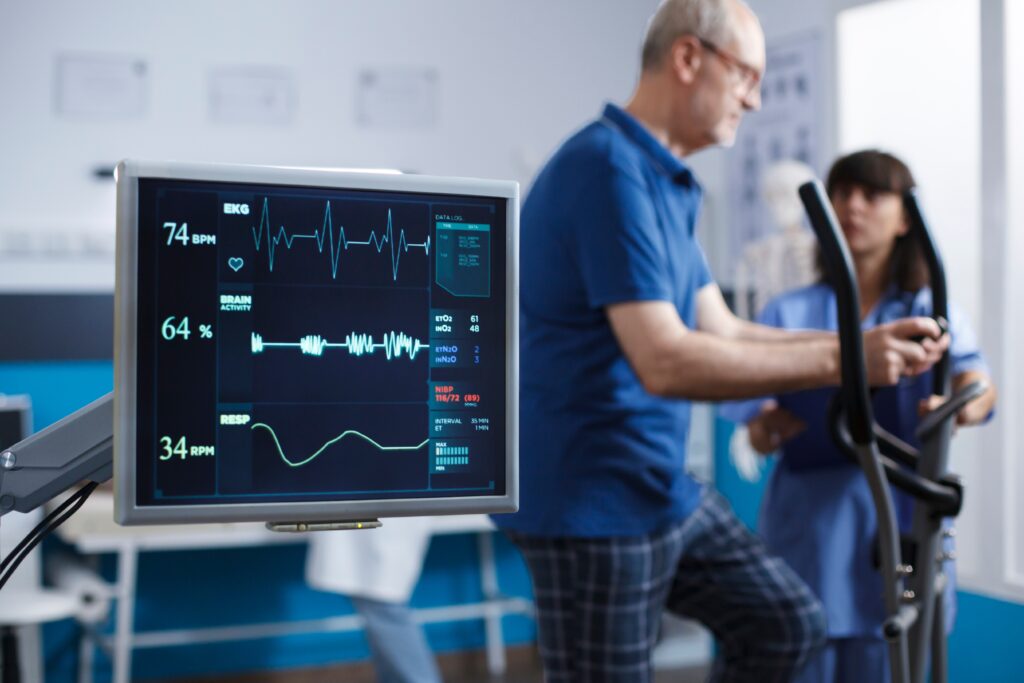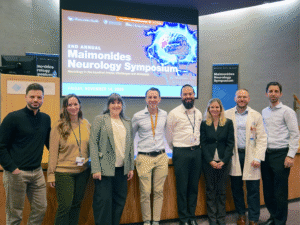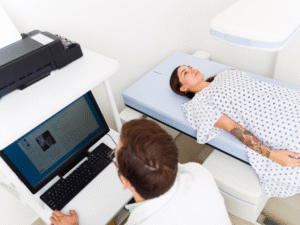Maimonides Heart & Vascular Institute has long been a leader in cardiac care. Thanks to the expertise of our world-renowned team of cardiologists and cardiothoracic and vascular surgeons, Maimonides Health ranks in the top 1% in the U.S. for patient survival following a heart attack, according to cms.gov.
A key part of this cardiac treatment success stems from our longstanding focus on post-heart attack rehabilitation. In 1985, Maimonides became the first major medical center in New York City to launch a cardiac rehab program. Since then, our commitment has never wavered on the power of cardiac rehabilitation — guided programs that oversee patients’ return to exercise following a heart attack for improved heart health and function.
“Cardiac rehab has been proven over and over all across the world to save lives, decrease heart attacks, and decrease death from heart disease,” says Warren Wexelman, MD, clinical cardiologist and Founding Director of the Maimonides Cardiac Rehabilitation and Exercise Program. “I view it as a lifesaving part of healthcare.”
Science-Backed Approach to Heart Attack Recovery
From the early 1910s until as late as the 1970s, protocols encouraged prolonged bed rest following a heart attack. Providers commonly advised patients to lie still and limit physical activity for weeks or even months while their heartsrecovered. The problem was that this approach did not lead to improved health outcomes; it only led to hearts that were deconditioned and apt to feel strained under regular daily activity.
Slowly, a more modern understanding evolved to incorporate targeted exercise training to safely rehabilitate the heart muscle following a cardiac event. Today, scores of scientific studies have proven the merits of cardiac rehabilitation.
“There are hundreds of articles that say if patients attend a cardiac rehab program for roughly 36 sessions, they will decrease their mortality and the number of future heart events anywhere from 39 to 42 percent,” Dr. Wexelman explains. “The outcomes of exercise-based treatment are as good as, if not better than, some preventive cardiac medications we prescribe.”
A Staged Approach to Better Heart Health
At Maimonides, patients can participate in both inpatient and outpatient cardiac rehabilitation. Inpatient rehabilitation services include bedside programming for patients recovering from heart attacks, coronary disease, angina, valve problems, and heart failure.
This summer, Maimonides will relaunch its inpatient cardiac rehab services to include expanded services throughout its cardiac care floors. The inpatient rehab reboot follows the opening of Maimonides new Cardiothoracic Intensive Care Unit (CTICU) last year. Both efforts are part of the hospital’s overall strategy to ensure the best possible patient outcomes following major heart events.
During inpatient rehab, targeted teams of cardiologists, nurses, and physical therapists will monitor and support cardiac patients as they get out of bed and do simple movements. With this approach, patients have immediate access to medical intervention should they experience negative vital readings or side effects when regaining mobility following a heart event.
Once patients are discharged from the hospital, they become eligible for the second stage of cardiac rehabilitation: an outpatient monitored exercise program. During these sessions, patients can expect to work out on treadmills and ergometers, so-called “upper-body bicycles,” to get supervised, targeted exercise for their heart and lungs.
Participating patients typically come to Maimonides three times a week for one-hour exercise sessions overseen by doctors, physical therapists, and a dedicated nursing team. During these sessions, EKGs continuously monitor each patient’s heart to screen for any signs of cardiac distress.
Maimonides is actively accepting referred patients to its outpatient cardiac rehabilitation program. There is no wait list, and care providers can refer eligible patients through a simple, 10-minute online process. Candidates who can benefitfrom cardiac rehab include patients who have a history of heart attack, valve disease, heart failure, or peripheral arterial disease, or who have had an angioplasty or stent procedure.
The end goal of rehabilitation is to return heart attack and heart disease patients to their normal, active lives. Following completion of the program, most patients can resume their typical daily work and leisure activities without limitation, and many sustain a higher level of physical activity than they did prior to their cardiac emergency.
“People fear that their normal lives might be over following a heart attack, but cardiac rehab is really the beginning of a new, better, and healthier life,” Dr. Wexelman says.
Expanding Access
The science behind the efficacy of cardiac rehabilitation programming is clear, yet currently, fewer than one in four U.S. patients who might benefit from rehab take part.
From referral obstacles to insurance coverage and schedule limitations, patients may face a myriad of reasons for skipping out on cardiac rehab. But Dr. Wexelman wants to break down those barriers through targeted outreach.
“New York has the lowest utilization of cardiac rehab of any U.S. state, and Brooklyn has the lowest utilization of any place in New York City,” he says. “So, we have work to do.”
Dr. Wexelman hopes cardiac providers across Brooklyn, especially, can help get the word out about the healing power of cardiac rehab programming.
“Doctors have to understand that just like prescribing aspirin, statins, and beta blockers to lower cholesterol and prevent heart disease, cardiac rehab is an equally important part of cardiac care,” Dr. Wexelman says. “That’s my mission now. We must get doctors and practitioners to understand this is a priority. Exercise is medicine, and we need to prescribe it.”
Learn how the Maimonides Cardiac Rehabilitation and Exercise Program supports recovery and continuity of care. For referral coordination, call 718-HRT-BEAT (718-478-2328) or (718) 283-3020.




